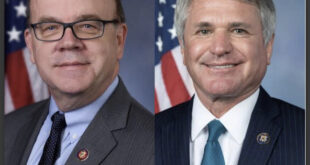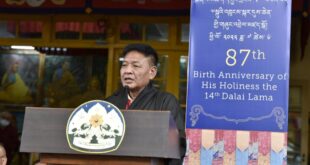On February 21, the Dalai Lama visited United States President Barack Obama in the White House over the objections of the Chinese government. Beijing labels the exiled spiritual leader a “wolf in sheep’s clothing” who seeks to use violence to free Tibet from Chinese rule. The Dalai Lama, who fled to India after a failed uprising in 1959, disavows the use of violence and says he only wants autonomy for Tibetans. He and Obama previously met in February 2010 and July 2011.— The ChinaFile Editors
Isabel Hilton
ChinaFile.com
February 22, 2014
What Can the Dalai Lama’s White House Visit Actually Accomplish? There are many reasons why President Obama was right to meet the Dalai Lama: firstly the president has the sovereign right to meet whomsoever he chooses within his own borders, a principle no leader should be willing to sacrifice. Secondly, although the Chinese government routinely issues loud but vague threats of retaliation, it rarely follows through. Some years ago, the European Union chamber of Commerce in Beijing investigated whether any variation in trade or investment between China and EU member states could be mapped against meetings with the Dalai Lama: they could find no correlation. Similarly, whilst the British prime minister David Cameron’s meeting with the Dalai Lama in London in August of 2012 provoked protests and threats from Beijing that did cool political relations for more than a year, trade flows and investment flourished.
The decision to hold such meetings is a matter of political judgment rather than economic risk: is the Dalai Lama a terrorist or an individual whose record should preclude such a meeting? What does it signal at home and abroad? What might it achieve?
Pace Beijing’s rhetoric, the Dalai Lama is not a terrorist, but one of the world’s leading advocates of non-violence. Meeting him signals that the host country supports the proposition that human rights matter, and that non-violence and dialogue are the best way to resolve disputes, especially disputes as bitter and intractable as this one.

Beijing, of course, continues to insist that meeting the Dalai Lama implicates President Obama in a threat to China’s territorial integrity. In fact, the Dalai Lama is asking for “meaningful autonomy” within the border of the PRC on behalf of the Tibetan people, a position, ironically, that the P.R.C. also claims to embrace. In fact, the so-called 17 Point Agreement for the Peaceful Liberation of Tibet, the treaty signed under duress by the government of Tibet and the P.R.C. in 1951, provided for just such a meaningful autonomy. A more recent precedent is the “one country, two systems” agreement that governs relations between Hong Kong and the P.R.C., which allows Hong Kong considerable freedom to run its own affairs, whilst enshrining Beijing’s sovereignty.
Besides, if China seriously regards any meeting with individuals who advocate separatism or independence as a threat to national sovereignty, what are we to make of the several meetings that Prime Minister Li Keqiang has held with the First Minister of Scotland, Alex Salmond? Mr. Salmond is definitely a “splittist”: as leader of the Scottish Nationalist Party, he has built his entire political career on the case for Scottish independence and hopes to win a referendum on independence later this year.
The U.K. government has offered no protest to Beijing about any of the several meetings that have taken place between Mr. Salmond and Li Keqiang, all of them loaded with political significance for Mr. Salmond. When Premier Li Keqiang obliged his host by donning a tartan tie, should the UK government have read it as a gesture of support for Mr. Salmond’s efforts to break up the United Kingdom?
Tibetans are increasingly alienated from Beijing, a trend that has accelerated since the uprising in 2008, and Beijing’s continuing heavy security response. The fact than 126 citizens have chosen to set fire to themselves since 2009, rather than to continue to live under the conditions that Beijing has created, is hardly a ringing endorsement of China’s policies. But, far from concluding that its actions have been counter-productive, Beijing has compounded its many errors by insisting on blaming a spiritual leader who has been in exile since 1959.
By Beijing’s logic, the Dalai Lama continues to wield astonishing power and authority among people, most of whom have never seen him and have no direct memory of life before the Chinese occupation. If that is what Beijing truly believes, the case for resuming talks with the Dalai Lama is even stronger: not only will there be no peace without negotiation, but by Beijing’s own reasoning, the Dalai Lama remains the only figure with the authority to win acceptance of a negotiated settlement both in the exile community and in Tibet.
Such an agreement would benefit China in many ways: it would improve its international image and relations with India and Nepal, and it would alleviate the growing suffering and despair in Tibet. This would spare the Chinese government the security risks of further unrest and the costs of keeping Tibet locked down for the foreseeable future.
Since the uprising in 2008, mistrust between Tibetans and Han has grown, and, although Beijing appears to have learned remarkably few lessons from its policy failures, there is, nevertheless, a subdued debate in Beijing on China’s policy failures in Tibet.
Chinese President Xi Jinping has a great opportunity, as a new leader, to make a fresh start and to challenge the vested interests that cling to the old, failed approach, but the opportunity to reach a settlement is shrinking: the Dalai Lama is no longer young, and, since his years of advocacy of non-violence have not been rewarded, many young Tibetans regard his policy as a dead end. Without his restraining authority, the situation could certainly deteriorate further.
If this small window closes, the best opportunity for a settlement that would benefit both sides will be lost. It is strongly in the interests of China’s partners to encourage a change of policy in Beijing by all possible means, including through frequent meetings with the Dalai Lama. To fail to meet him out of fear of Beijing’s protests threats risks encouraging the mistaken belief that China’s policies in Tibet are acceptable to its trade partners and to international public opinion. Such an outcome would be seen as a victory for the hardliners in Beijing. Meeting the Dalai Lama is not, in itself, enough break the policy ice in China, but it is a key signal of a commitment to a constructive and peaceful settlement.

